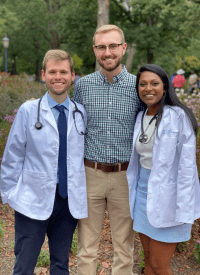Musings of a Former Pre-Med Levine Scholar Alumni – Seth Flynn ’19

Hi there, LSP! My name is Seth Flynn, and I am currently a third-year medical student at the Duke University School of Medicine. I graduated from UNC Charlotte as a Levine Scholar in 2019 with degrees in Biology and Chemistry and a minor in Sociology. My time at UNC Charlotte provided some of the most formative experiences and cherished memories of my life, and it was an honor to spend four years with (though I may be biased), the most inspiring, friendly, and encouraging peers, faculty, and mentors in our great state. My path to medical school was a bit circuitous, so it’s an honor to share my personal experiences.
I entered UNC Charlotte as the first person in my family to seek a four-year degree. I first want to emphasize that it is natural, and even expected, to feel uncertain about what majors or subject matter you are most drawn to. For example, I started out as a mechanical engineering major, quickly realized that engineering was not the right fit for me and spent most of my freshman year drifting between general education courses without a clear notion of my future career prospects. I am the type of person who feels more confident and self-assured when I have a concrete plan, so I sought out advising from the sage LSP office and Dr. Hanie of pre-health professions advising to mull over my options. I highly recommend speaking with Dr. Hanie early, as she is an expert at teasing out which fields are the best fit for you. I wholeheartedly committed myself to optometry, even joining UNC Charlotte’s “EyeCU” club as an executive board member, and the rest was history.
Except clearly, I am not in optometry school. I shifted my declarations from optometry school to physician assistant school to a brief stint of intense interest in pharmacy school before finally settling on medical school in my junior year. Thankfully, these myriad interests shared many pre-requisite courses, so it was somewhat seamless to explore my evolving understanding of my professional aspirations. If you are considering a pre-health track, it is essential to get early and ample clinical experience, as these experiences can help you ascertain if you can envision yourself in that career (and re-direct as necessary). Furthermore, many programs have minimum requirements for direct clinical hours prior to considering your application (notably physician assistant programs, but more recently medical schools have been emphasizing the value of hands-on clinical experience as well). I know firsthand that this can feel tough to balance with heavy course loads, remaining connected with family and friends, and prioritizing mental and emotional health, but it is something to strongly consider once you have put down roots and established a healthy network and sustainable routine later in college. I worked as an emergency department medical scribe for one and a half years, which was invaluable for seeing how patients navigate the healthcare system and gave me many stories to share during medical school interviews.
Although I chose to apply to medical school without taking a gap year, it is worth noting that the average age of matriculation is steadily rising, and many medical school programs explicitly prefer that applicants take a year to engage in clinical work, pursue a graduate degree such as a Master of Public Health, bolster their research experience through research fellowships, or participate in nationally competitive programs such as the Fulbright Scholarship. Gap years also offer a chance to devote full focus on studying for the all-important Medical College Admissions Test (MCAT) and spend more time crafting and revising personal statements and admissions essays. It is certainly possible to take the MCAT, complete applications, and travel for interviews (depending on COVID regulations) while enrolled as a full-time student, but it is exceptionally physically and mentally taxing. I am happy to discuss this further with anyone who has lingering concerns about the relative values and trade-offs of taking a gap year and navigating the application process.
Finally, it is perfectly acceptable to tailor your civic engagement activities and non-profit internships to fit your pre-health interests, but I would also urge you to devote your precious little free time to things that are personally refreshing and restorative. My favorite volunteering activity was calling Bingo and helping with other activities programming for the older adults living at one of Charlotte’s Brookdale Senior Living communities. I will never forget my Saturday morning Bingo crew. Out of this volunteering partnership blossomed an opportunity to complete my civic engagement project renovating the community’s greenspace and installing birdhouses hand-painted by the residents across the courtyard. Though not related to medicine, these experiences also frequently came up in interviews (and more importantly, they kept me going through even the most challenging times as a student at UNC Charlotte).
Even if your heart has been set on medical school since you were a child, take the opportunity as a Levine Scholar to fully explore your interests and follow them wherever they may lead, though they may shift your trajectory in a completely unexpected direction. It is never too late to decide to pursue medical school, and it is never too late to decide that you’ve changed your mind and would find greater fulfillment in a different field, despite how regimented and clear-cut the pre-medicine track may feel. Gap year(s) can facilitate tremendous personal growth and offer experiences that may be harder to seek out once you enter a health professions program. One of my biggest regrets is not applying for a geriatrics-focused community intervention program in Ireland or throwing my hat into the ring for an HIV and public health-based Fulbright Scholarship in South Africa. Sign up for unexpected classes like Intro to Cello, as your schedule permits, take many evening walks around the Hechenbleikner Lake on campus, and please, do not start studying for the MCAT as a freshman.